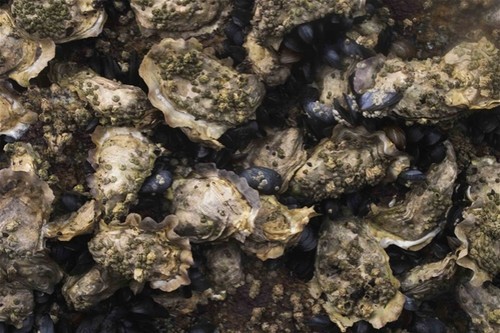Oysters/Mussels under Threat - Dissolving Shells
by Richard Gray/Sail-World Cruising on 6 Nov 2007

If carbon levels continue to rise, soon these may not be available for picking in the wild SW
Boaters beware, (or get active!) here is yet another way in which your beloved seas are under threat.
Oysters and mussels, along with other sea life that depends on them, are now being threatened by rising levels of carbon dioxide. By 2100 some waters are expected to be corrosive enough to cause the shells of mussels to dissolve
By the end of the century many popular seafood dishes will disappear from our tables as shellfish become increasingly scarce, scientists warn.
They have found that the build up of carbon dioxide in the atmosphere is causing the oceans to grow more acidic as increasing amounts of the gas dissolve in sea water.
This change is reducing the ability of shellfish to make their protective shells. By 2100 some waters are expected to be corrosive enough to cause the shells to dissolve completely, making it impossible for them to survive.
Marine biologists warn that this could have a devastating effect on the ocean environment, as other creatures that eat shellfish will find food increasingly scarce while corals, which make reefs, will also be unable to build their hard external skeletons.
Dr Carol Turley, from Plymouth Marine Laboratory, will tell a conference of doctors at the Royal Society of Medicine that climate change is likely to have a profound effect on human ability to use the oceans as a source of food.
Speaking ahead of the conference later this month, she said the fishing industry would struggle to find supplies of scallops, mussels and oysters for restaurant tables due to ocean acidification.
She said: 'The oceans take up carbon dioxide as we produce more and more into the atmosphere. They have already taken up half of the carbon dioxide released into the atmosphere since the industrial revolution.
'The problem this causes has only really emerged very recently.
'Many shellfish use calcium carbonate to make their shells, but the more carbon dioxide in the ocean, the less carbonate is available to those organisms that use it.
'A lot of shellfish are an important food source for fish as well as humans. The impacts of shellfish disappearing could be massive.'
Shellfish produce their shells by absorbing calcium carbonate from the water and depositing it around their bodies. Carbon dioxide, however, produces an acid when it is dissolved in water that reduces the availability of calcium carbonate, causing shellfish to grow far more slowly.
Dr Turley explained that in colder seas around the poles, the reaction is more profound and the water may even act to dissolve the shells of shellfish.
Scientists had originally hoped that by dissolving excess carbon dioxide in the oceans it might be possible to reduce the effects of climate change on the planet, but oceanographers now fear the move could be devastating.
Mussels, clams, scallops and oysters are expected to be the worst-hit as the oceans grow more acidic. However prawns, crabs and lobsters will escape unharmed as they produce their shells in a different way.
Coral reefs will also be hit as the coral polyps use calcium carbonate to create the hard skeletons that provide shelter and some of the most diverse habitats in the oceans.
Climate change scientists warn that ocean acidification will add to the other impacts of global warming. Many species can only survive in tight bands of water temperature so as the seas heat up, fish will be forced to find cooler waters.
Ocean acidification is also expected to affect the ability of fish to fertilise eggs.
Around 150,000 tons of shellfish are caught by UK fishing vessels every year and it now accounts for around 40 per cent of the fishing industry's catch as cod and haddock stocks have declined.
Dr Ian Totterdell, an ocean modeller at the Met Office's Hadley Centre for Climate Research, said: 'Carbon dioxide naturally dissolves in the oceans, but we have been tipping the balance by releasing more carbon dioxide into the atmosphere.
'For a long time this was seen as a good thing as it was helping to protect us from the full effects of greenhouse gases on the climate, but it now seems shellfish are suffering as a side effect.'
If you want to link to this article then please use this URL: www.sail-world.com/38856